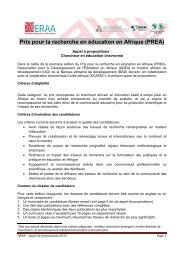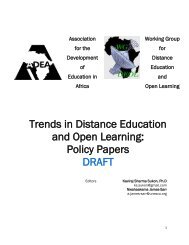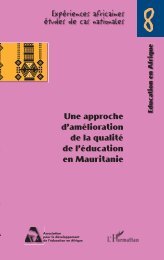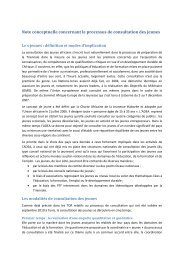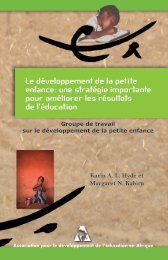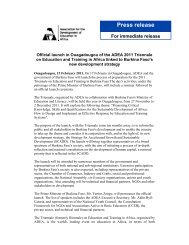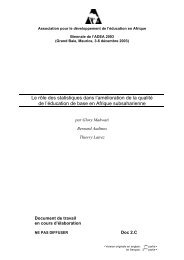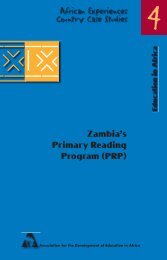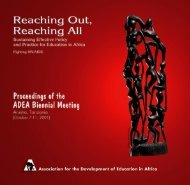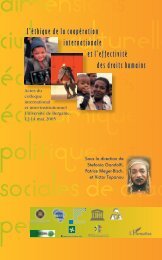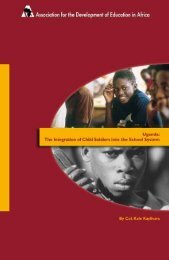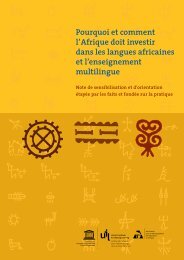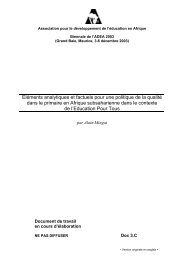Newsletter Vol.16 No.3 - ADEA
Newsletter Vol.16 No.3 - ADEA
Newsletter Vol.16 No.3 - ADEA
Create successful ePaper yourself
Turn your PDF publications into a flip-book with our unique Google optimized e-Paper software.
From the African PressAkintola Fatoyinbo Africa Education Journalism Award1 st Prize - 2004 Edition - Articles in EnglishThe blackboardsanctuaryBy Nkgakga Monare, Sunday Times, August24, 2003Faced with a growing number of AIDSorphans, a Pretoria school has come up with amodel support scheme, writes MOSHOESHOEMONAREKHANYI Mothutsi is a bubbly, talkative andsmart 15 year-old pupil at Bokgoni TechnicalHigh in Atteridgeville, outside Pretoria.“Hi, I understand you are looking for me,” shesays, with a twang in her voice that is mockedby her peers as a prod uct of her schooling at aformer white suburban school.But behind her lively, broad smile lies a traumaticloss. Her nine-month-old brother, father andmother died last year of a “mysterious illness”.And her name is not Khanyi Mothutsi, but that iswhat we are calling her to pro tect her.The girl’s life-orientation teacher, SithokozisoBlom, says Mothutsi is putting on a brave face,but inside she is emotionally hurt.“She seems okay on the surface but deep downshe is deeply traumatised by what has happenedin her family,” Blom says. “She needs emotionalsupport.”Mothutsi says she is well looked af ter by a relative,but adds: “I miss my mom. I wish I couldtalk to someone.”Her teachers say her performance at school,once above average, has dete riorated since thedeaths.Blom says a number of pupils at Bokgoni areexperiencing emotional break downs due to theloss of their parents.“They are often teased by other heartless children,especially on Moth er’s Day about who arethey going to give gifts to,” Blom says.Mothutsi is one of the 32 orphans at BokgoniHigh; 17 parents have died since January dueto what the school community euphemisticallyterms “mysterious illness”.And the number is rising. This week alone, twodeaths were reported.George Sono, a teacher, says the pat tern of deathsand the nature of ailments suggest the true realityof Aids. “It’s dif ficult for children to open up,but we talk to them and we get a sense of what’shappening in their homes,” he says.Deputy principal Vivian Bopape says: “We justannounce at the assembly that they [the parents]have died due to ill ness. As long as children don’tdisclose [the cause] we don’t inquire, becausethere is a stigma attached to Aids.”The situation has turned teachers in to socialworkers and the school into a charity organization.The government’s nutritional scheme has not yetreached secondary schools, but Bokgoni did notwait for a govern ment intervention programme.Instead, the school started a tuck shop, makingand selling sephatlo, Pretoria’s street sandwich(loosely translated as ‘half’).This is a quarter of a loaf of bread filled withchips, cheese, polony and mango atjar, explainsteacher Violet Raphiri.“We give [sephatlo] to the orphans free of charge.We noticed they were hungry most of the timeand couldn’t afford to buy something to eat. Thisaffects their attention span and perfor mance inclass,” says Raphiri.Orphans such as Kedib one Rakgotso (not herreal name), 16, who lost her parents this year,benefit from the school’s feeding scheme. Sheand her brother live with an aunt who earns R320a month. And while there is enough money forfood for about two weeks, she has come to relyon the school’s sephatlo.“Our aunt just buys us cake flour and we are ableto bake dumplings. But if the flour is finished,there’s no money to buy bread,” says Rakgotso.But some pupils tease her. “Some orphans endup not going to get their free lunch, but we oftenintervene and talk to them,” sighs Blom. “Someof these children can be cruel, you know.”Ignatius Jacobs, Gauteng Education MEC, sayshis department, along with the social welfaredepartment, are investigating the extent ofthe problem and the number of orphans in theprovince.“We are going to introduce a smart card that willgive orphans free access to basics such as foodand clothes,” Jacobs says.Elsewhere in South Africa, similar situationsexist. There are 25 000 orphans in schools inLimpopo Province and Mandla Msibi, spokesmanfor KwaZulu-Natal’s Education Department,says a major challenge is to train teachers to dealwith orphans.Mpumalanga also has what educa tion spokesmanThomas Msiza calls a “serious problem” withAids orphans. “We don’t have programmes forma terial support as yet,” he says.Apart from food, many of Bokgoni’s pupils haveother needs that need to be met. Bopape saysthe school’s alumni donate uniforms. “We alsoask our teachers to donate their clothes, whichwe give to some of the pupils for the matricdance. They don’t feel out of place and lonelythat way.”But the most daunting challenge to teachersis meeting the orphans’ emo tional needs. “Weare faced with traumatised learners who need[psychological] counselling and understanding.These are realities in our communities. Aidsis threatening our education system,” Bopapesays.Blom is Bokgoni’s only life-orientation andguidance teacher. Although she is not a qualifiedcounsellor, she holds sessions with pupils.“If I sense some emotional breakdown and otherproblems, I refer them to the commu nity socialworkers as we don’t have educational psychologistsaround.”Blom admits that she cannot cope alone. “It isnot easy to attend to the emotional needs of allof them as I also have to attend to 400 childrenin my classes, I have to mark their work andmonthly tests.”Nevertheless, Bokgoni has grown in to a beaconfor 1307 pupils from Atteridgeville and surroundinginformal settlements. Its tenaciousoptimism has seen pupils flocking to the school,previously spurned as a low-class handicraft college.(It now offers mathematics and science ascompulsory subjects.) Pupil numbers grew from130 in 1997 to more than 1 307 this year. As a result,teachers have been forced to use classroomsat two neighbouring schools.Bokgoni’s results have also im proved dramatically.In 1994, the 18 matriculants who wrote thefinal exams all failed. Last year, 88% of the 34matriculants passed.However, like at any other South African school,keeping quality teachers is a huge problem. Theschool is feeling the effects of the Gauteng Departmentof Education’s strategy of making mostposts temporary. Out of Bokgoni’s 40 teachers,only 17 are permanent. The rest are employed ona three-month contract basis.Still, after realising the true impact of HIV/Aidson their school, pupils have decided to bond togetherand form a “front” to deal with preventivemeasures and educational campaigns.“We have realised the only way to deal withthese problems is to encourage learners to getinvolved,” says. Raphiri. The school has selected18 pupils to form a “cabinet”, with each learnerallocated a “ministry” or portfolio. These includethe ministries of environment, education, health,sports and welfare.“As minister of health my responsibility is tocome up with a plan that will help us to spreadthe Aids message to the school, youth and thecommunity,” says Kholofelo Mokwena, 16, aGrade 10 pupil.“I would want my mother to talk more to me aboutAids and sexuality, but she doesn’t. Hence I amleading this campaign to get more Aids educationand parental involvement,” Mokwena says.Chairman of the cabinet, Kgaohelo Ramohwebo,16, says their biggest struggle is to raise moneyto fund programmes and help orphans.“We came up with a plan to donate at least R1a month, but it is difficult to get money frompupils because most of us are from poor families,”he says.The pupils have formed a Sepedi dancing groupas part of their fundraising efforts. The group’scolourful costumes and heartfelt performancesstand for strength, hope and determination toovercome the social hardships facing their classmatesand their school.At Bokgoni, teachers and pupils have managedto turn a centre of learning into a compassionatehome for pupils living with pain and emotionalemptiness. ▼Nkgakga MONARE4 <strong>ADEA</strong> <strong>Newsletter</strong> July - September 2004



